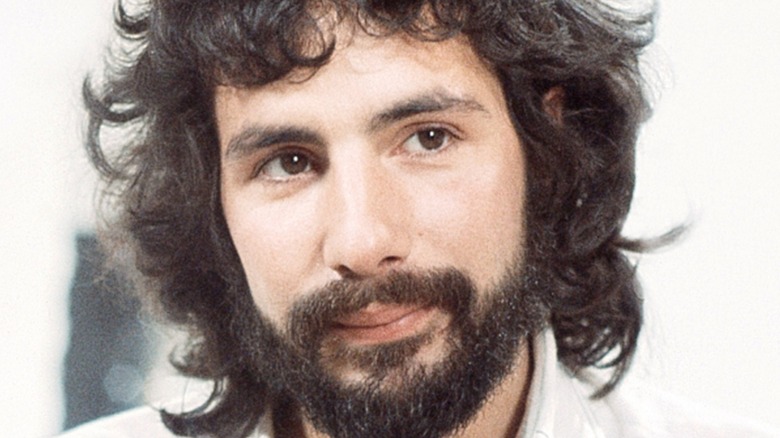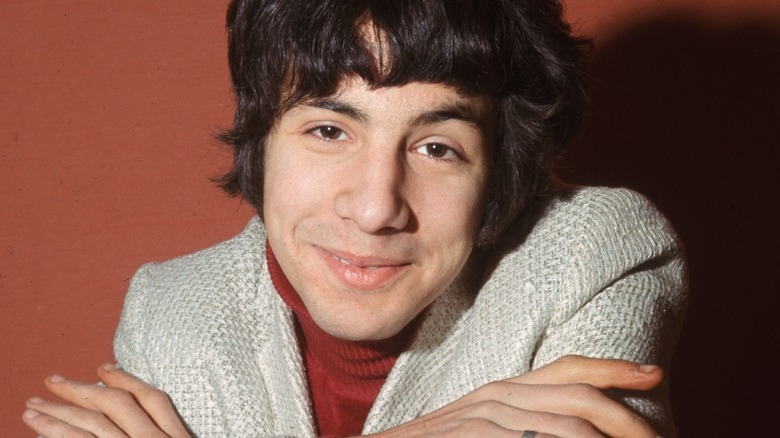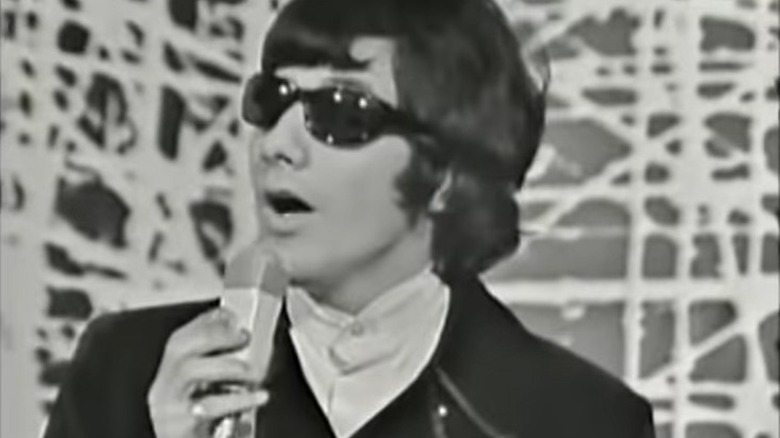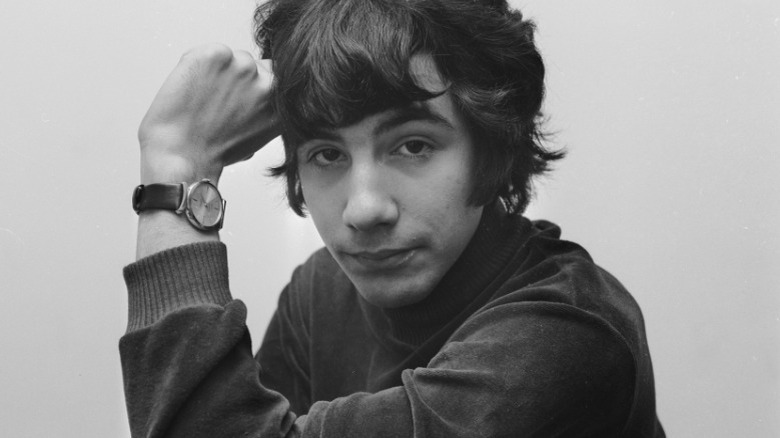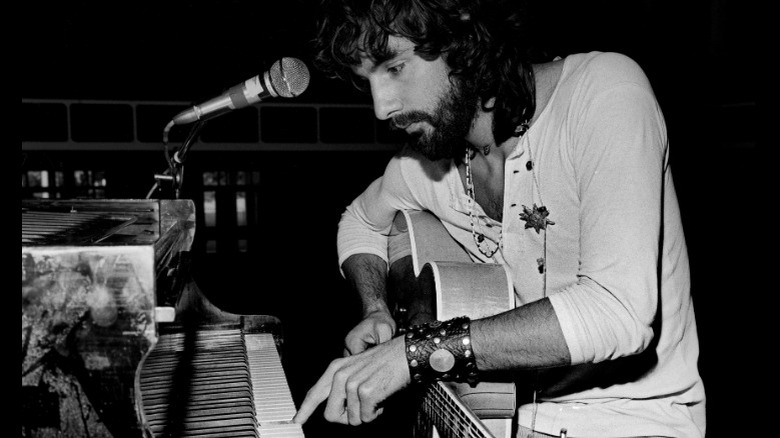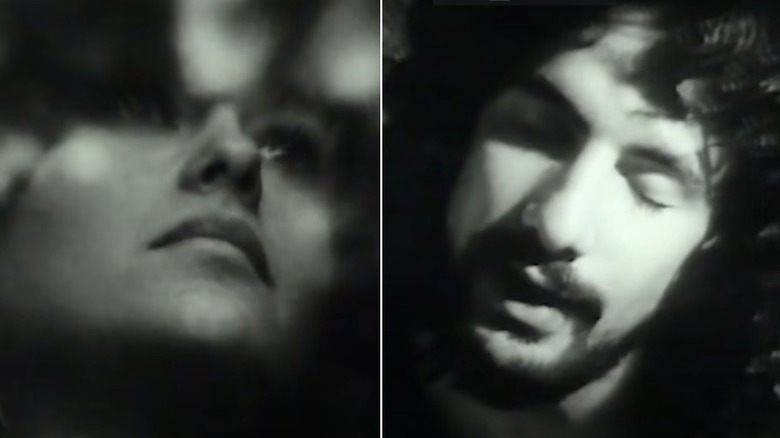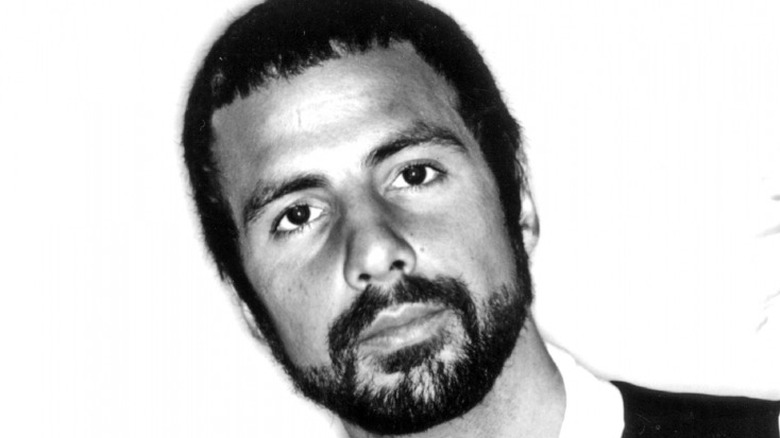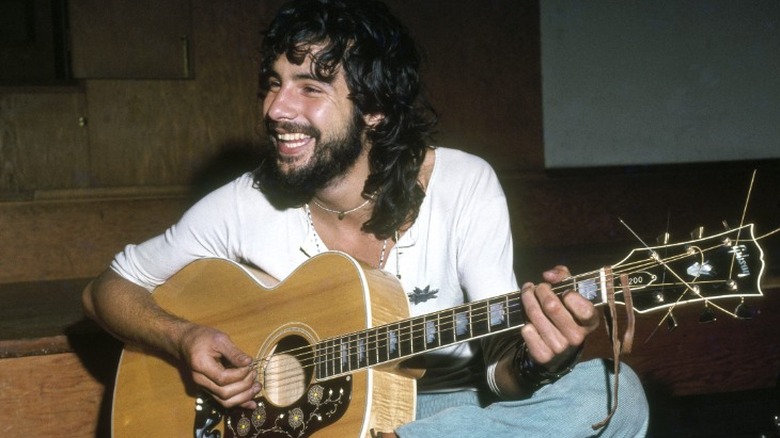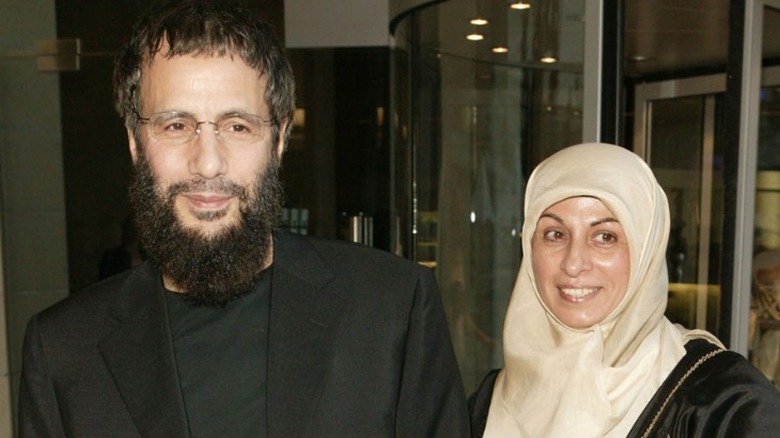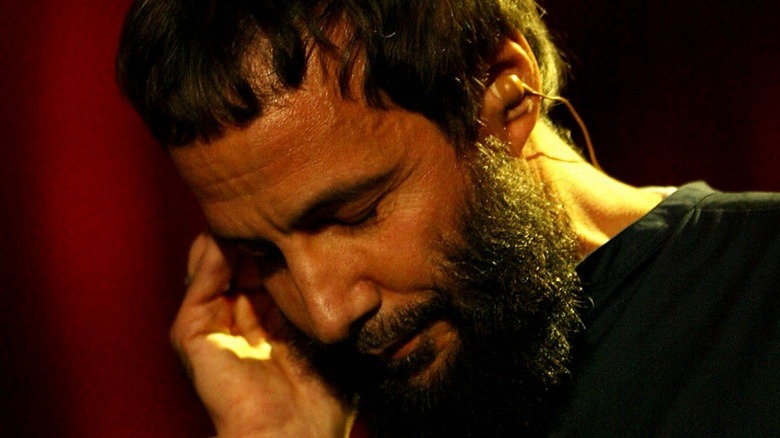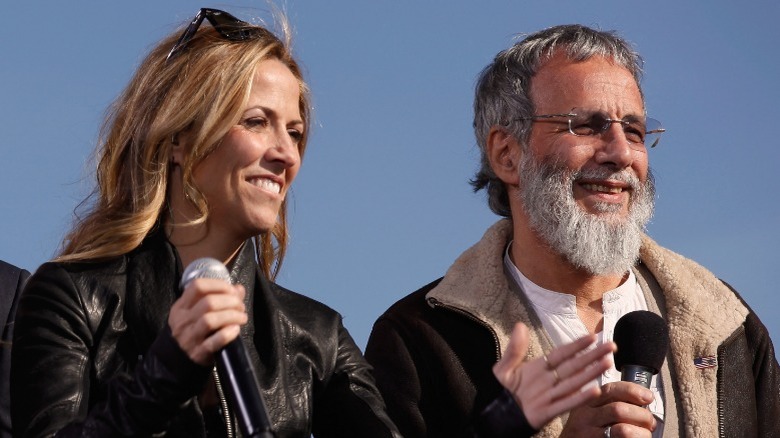The Tragic Story Of Cat Stevens
Few artists have endured a career arc quite as polarizing and bizarre as that of singer-songwriter Cat Stevens. Once a doe-eyed teen pop star in 1960s London, Stevens became an international sensation when he transitioned to life as a '70s folk balladeer, connecting with audiences the world over through his honest, heartfelt music and relatable lyrics. Songs like "Wild World," "Peace Train," and "Morning Has Broken" became instant classics.
His music – which tackles mortality, loss, self-reliance, humanitarian concerns, and the eternal quest for spiritual meaning over delicate guitar and piano arrangements – possesses an enduring, timeless quality that continues to resonate with people young and old. In 2014, he was inducted into the Rock and Roll Hall of Fame, and, as of 2023, has released 16 albums over the course of his 50-year career.
Shockingly, Stevens walked away from the music industry at the height of his fame to pursue the Islamic faith. A lifelong advocate of peace, he has since won many awards for his philanthropic work. Still, he is remembered for the various controversies that plagued his life as much as for his musical and charitable contributions. From multiple near-death experiences to media mishaps to religious discrimination, here is the tragic story of Cat Stevens.
He never felt a sense of belonging
Born Steven Demetre Georgiou to a Greek Cypriot father and Swedish mother in 1948, Cat Stevens was exposed to Greek Orthodox, Baptist, and Roman Catholic religions at an early age. His parents owned a Greek restaurant in London's Soho District, and he and his family lived in an apartment above it. Inspired by big Greek weddings, Nina Simone, and the famous musicals he overheard across the street, young Stevens soon developed an aptitude for music. He began learning the piano and, later, after hearing Lead Belly and The Beatles, the guitar.
Still, he admitted to Melody Maker Magazine in 1975 that it was a lonely life, with his unique heritage isolating him from his peers. He had dreams of becoming a painter or cartoonist (he would later illustrate his own album covers), but he struggled with less creative subjects and became something of a troublemaker. "In school, I was 'the artist boy,'" he told Stereo Review Magazine in 1972, adding, "I was beat up but I was noticed."
He also never felt particularly masculine. "I saw these idols like Spartacus and Kirk Douglas and I thought I'm not of that," he told Melody Maker Magazine in 1973, adding, "When I was very young, I never really felt one sex or the other. Gradually I was brainwashed into thinking I was a fella, but maybe when I write a song or a story about a relationship it has many more areas."
Teen stardom drove him to substance abuse
Cat Stevens started performing songs at local bars in the early 1960s under the name Steve Adams. It wasn't long before he caught the ear of local record producer Mike Hurst, who signed him to Decca Records. According to a 2002 interview with The Australian Women's Weekly, Stevens chose the catchier stage name Cat Stevens because a girlfriend once told him he had cat-like eyes. By 1966, he had scored his first hit with the offbeat love song, "I Love My Dog."
Stevens' original career plan was to write songs for other artists. Indeed, his 1967 song "The First Cut is the Deepest" became a smash hit for soul singer P.P. Arnold and countless others over the decades. But with the 1967 release of his album "Matthew & Son" – which included the catchy titular song and "Here Comes My Baby"– he became a bona fide pop star.
Becoming famous at just 18, the introverted Stevens was cast into a hectic world of nonstop interviews, production, and performance. In 1967, he embarked on a tour with Jimi Hendrix, which introduced him to a destructive hedonistic lifestyle involving smoking, drugs, and alcohol. In a 2020 interview with The Guardian, he admitted to drinking to ease extreme stage fright. "They made me larger than life, so I wanted to live larger than life," he wrote in his 2004 essay "How I Came to Islam," adding, "And the only way to do that was to be intoxicated."
His first record label was not supportive of his new direction
Cat Stevens' first album, "Matthew & Son," saw immense commercial success on Decca Records under the direction of producer Mike Hurst. Naturally, Hurst was eager for a similar follow-up. And that's where the trouble began. "It's not as easy as that," Stevens told Michael Wale in an interview for "Voxpop" in 1972, adding, "Because the songs aren't like that. Life isn't like that, you just don't do the same thing over and over again ... It was just a business after a while. The whole music element, the thing that made me want to create music, was suddenly shoved aside."
Stevens sought a more authentic folk sound, while Hurst pushed for more polished pop songs with heavy instrumentation. "There were a bunch of musicians in the studio who interpreted your own music for you," Stevens told Classic Rock Magazine in 2004, adding, "It seemed to me that I had to get more control." The result of this tension was Stevens' second album, 1967's "New Masters," which failed to live up to the hype of its predecessor.
Hurst later admitted to making mistakes, noting the intense legal battle that ensued. "We did the second album with lawyers actually in the studio," he told renowned music journalist Chris Charlesworth, adding, "It was horrendous." As Hurst explained to Cherry Red Records in 2020, everything was eventually settled out of court and Stevens was released from his contract with Decca Records.
Cat Stevens almost died of tuberculosis
In 1968, when he was just 20 years old, Cat Stevens' pop star lifestyle caught up with him. After years of overworking himself, smoking and drinking heavily, and enduring a stressful legal battle with his record label, he fell dangerously ill. He lost an alarming amount of weight and developed a persistent cough – which worsened to the point where he was coughing up blood – before finally seeking medical advice.
Stevens was diagnosed with advanced tuberculosis – which had caused a collapsed lung and severe pneumonia – and was immediately hospitalized. Told he was likely weeks away from death, he spent three months in intensive care suffering through painful lung procedures and around a year recovering from the life-threatening illness. "TB ruined my career and put a halt to my dream," he told Chris Charlesworth in his book "Cat Stevens: The Definitive Career Biography," adding, "I was back on Earth, stuck in hospital and that was a big lesson ... I had a lot of time to reflect. Death was on my mind."
During his long convalescence, he wrote around 40 songs, which would provide the material for his next three albums: 1970's "Mona Bone Jakon" and "Tea for the Tillerman" and 1971's "Teaser and the Firecat." In 2021, he told Goldmine Magazine that one song in particular – the despair-laced "Trouble" – was directly inspired by his struggle with tuberculosis, its title and lyrics being a play on "TB," the colloquial term for the illness.
A failed relationship haunted him for years
Shortly after recovering from tuberculosis, Cat Stevens met young American model and actress Patti D'Arbanville at a rock star party in London. As D'Arbanville recalls in an interview with famous groupie Pamela Des Barres in her book "Let's Spend the Night Together," she found Stevens approachable – compared to Jimmy Page, who was also at the party – and became close with him after the two rode a roller coaster together. They dated for around two years, kissing in the grass, watching the 1969 moon landing, and spending time in his red-painted bedroom, which contained only a bed and a piano.
But D'Arbanville's career frequently took her to faraway places like Los Angeles and New York City and, eventually, into the arms of Mick Jagger. Heartbroken, Stevens penned the haunting ballad "Lady D'Arbanville," in which he professes his love to her corpse, singing, "I loved you, my lady, though in your grave you lie. I'll always be with you; this rose will never die." "I cried the first time I heard it," D'Arbanville admitted to Des Barres, adding, "Because that's when I knew it was really over."
Stevens' relationship with D'Arbanville inspired a few other songs as well, including "Maybe You're Right" and, most notably, 1970's sweet and candid "Wild World," which became a breakout hit for the newly reinvented Stevens. When asked about the song in a 2021 interview with Guitar World Magazine, he simply said, "It had ended and I wished her well."
He had an identity crisis and exiled himself
When he was 25 years old, Cat Stevens put himself in voluntary exile. Having become a superstar with several successful albums under his belt, he began to feel lost and uninspired in the bustle of fame and excess and suffered an identity crisis. Donating his tax money to children's charities rather than the British Government, he moved to Brazil – then considered an off-the-grid location – and did some soul-searching.
"I went to Brazil and I had a house there and I stayed alone," he told Melody Maker Magazine in 1975, adding, "I couldn't even talk to the lady who cooked and kept the place clean. I really felt alone and it hurt for a long time." He also shaved his trademark long curly hair and beard – rendering himself virtually unrecognizable – and visited places like starving, war-torn Ethiopia, Bangladesh, and Kenya. In a 2022 Instagram post, he claimed this was an "attempt to get off [his] privileged pedestal and get closer to humanity."
The result was 1973's "Foreigner," an even-more-stripped-down departure from his previous work. To create "Foreigner" – an album centered around the theme of being misunderstood – Stevens recorded songs with local musicians and produced the entire album himself. "To be able to write with feelings, you have to know yourself," he told Melody Maker, adding, "Writing has to be an affair with yourself and you have to be able to live with yourself and get through all your hang-ups. And I did."
He nearly drowned in the Pacific Ocean
In 1976 – the same year as his explosive Majikat Earth Tour – Cat Stevens experienced a pivotal moment in his life. Alone on a beach in Malibu, California, he decided that the water looked inviting and went for a swim in the Pacific Ocean. He soon found himself caught in a dangerous riptide, which was quickly pulling him out to sea.
"After I was swimming for about half an hour, I couldn't get back to shore," he told KQED'S Michael Krasny (via Salon Magazine), adding, "At that point, quite simply, there was no one to help me. As they say, you'll never find an atheist on a sinking ship. I called out. I said, 'Oh God, if you save me, I'll work for you. And at that moment a wave, however big it was, came from behind me and pushed me forward and suddenly I had all the energy I needed. I was back on land and safe. Some people would say, well, it was a coincidence. But for me, it was life and death. It was a miracle."
Shortly after the near-death experience – the second in his young life – Stevens' older brother gifted him a copy of the Qur'an, the religious text of Islam. "I would never have picked up a Qur'an," he admitted to The Independent in 2020, adding, "But it became the gateway. After a year I could not hold myself back. I had to bow down."
Cat Stevens quit making music
In 1977, Cat Stevens surprised the world when he became a Muslim. Then again in 1978, when he changed his name to Yusuf Islam, leaving the persona of Cat Stevens behind. Stevens chose the name Yusuf after reading about the Qur'anic prophet Joseph, finding the parable in which he is sold like a commodity similar to his own experiences in the music industry. But the biggest shock came in 1979, when he decided to quit making mainstream music.
Though being a musician was not expressly forbidden in Islam, Stevens was already disenchanted with the music industry, fame, and the hedonistic rock star lifestyle and chose instead to embrace a more conventional existence. While many were taken aback by his seemingly sudden decision, Stevens told "Desert Island Discs" in 2020 that it was a long time coming, pointing fans to his more spiritually introspective songs like "The Wind" and "On the Road to Find Out."
"If you had listened to my lyrics, you would have heard that I was on a path and I was definitely looking," he told Chris Anderson on TED Archives in 2017, adding, "And if I was sincere at all about what I wrote, it meant that if I found something, I'd have to grab it. Otherwise, I'd be a hypocrite to myself and to others. And that would be a bad example." Fully committed to his new faith, Stevens sold all of his guitars and donated the money to charity.
He lost a child
Shortly after converting to Islam, Cat Stevens married Fauzia Mubarak Ali – a Pakistan native with a Master's degree in Literature – in 1979. Many believed it to be a traditional arranged marriage, but Stevens set the record straight on his personal website. "I had two prospective girls I was interested in marrying," he wrote, adding, "I invited them to meet my mother and then asked her opinion. She told me her preference and I agreed. I had no intimate relationship with either before marriage. Therefore, to Western standards, and my own previous track record, this was a stark departure from the norm."
The couple has five children together. Their oldest daughter, Hasanah, is a record company executive, their second daughter, Asmaa Eve, is a lawyer, their third daughter, Maymanah, is a charity worker, and their fourth daughter, Aminah, is a professional photographer. Their son, Muhammad, is a singer-songwriter who goes by the stage name Yoriyos Adamos, a nod to his Greek heritage. He also serves as his father's manager.
Sadly, as Stevens noted on his personal website, their sixth child, son Abd Al-Ahad Ahmad, died at just 13 days old due to an incurable heart condition. The couple has been married for 44 years as of 2023, splitting their time between London and Dubai. Together, they manage several schools and charities and spend time with their many grandchildren.
He was blacklisted for making controversial remarks
In 1988, author Salman Rushdie published "The Satanic Verses," a magical realist novel deemed offensive to Islam. So much so that in 1989, then-Iranian Supreme Leader Ayatollah Khomeini placed a death fatwa on Rushdie, in effect ordering Muslims to kill the author. As a result, Rushdie endured several assassination attempts and the novel's translator was murdered.
Cat Stevens became involved in 1989 when he was asked about the fatwa following a speech at Kingston University and again on the Australian TV show "Geoffrey Robertson's Hypotheticals," both times making statements appearing to support it. Naturally, the press ran wild. Stevens told Rolling Stone that his university comments were taken out of context, claiming that he was merely quoting directly from scriptural texts. On his personal website, he explained that the incriminating television interview was the result of intentional editing combined with his British sense of humor. He also claims to have released a statement immediately afterward clarifying his opposition to the fatwa, but this received little press.
"I never called for the death of Salman Rushdie nor backed the fatwa issued by Ayatollah Khomeini – and still don't," Stevens wrote on his website, adding, "The book itself destroyed the harmony between peoples and created an unnecessary international crisis." Nonetheless, the public's outrage was great. Stevens' music was banned from many radio stations, DJs smashed his records on air, and 10,000 Maniacs removed their cover of his song "Peace Train" from their catalog.
Cat Stevens was labeled as a terrorist
Cat Stevens was denied entrance into Israel in both 1990 and 2000 due to allegations that he had donated money to Hamas – an Islamic terrorist organization – during a previous visit in 1988. Stevens denied these allegations, claiming he was only providing humanitarian aid. "I have never knowingly supported Hamas or directed money to them," he wrote on his personal website, adding, "[I] use my charity worldwide to help victims of war and natural disasters, particularly children and orphans."
But his troubles only intensified after the September 11 attacks in 2001. Stevens spoke out against the tragedy in a statement (via Rolling Stone), writing: "I wish to express my heartfelt horror at the indiscriminate terrorist attacks committed againt innocent people of the United States yesterday. While it is still not clear who carried out the attack, it must be stated that no right-thinking follower of Islam could possibly condone such an action."
Still, tensions in America remained at an all-time high. In September 2004, while flying to Washington, D.C. to meet Dolly Parton for a collaboration, Stevens' name – Yusuf Islam – was identified on the No Fly List. His plane was rerouted to Maine, where he was interrogated by Homeland Security officers. He was then deported back to London. Stevens told ABC News that he believes it was a case of mistaken identity, as he was repeatedly asked to spell his name. He has since returned to the U.S. several times without incident.
He was wrongfully accused of being sexist
In 2007, the World Entertainment News Network published an article claiming that Cat Stevens had refused to talk to unveiled women while at an awards ceremony in Germany, making him out to be the ultimate misogynist. Once again, Stevens took to his personal website to clear the air. "The accusation that I do not speak or interact with ladies who are not veiled is an absurdity," he wrote, adding, "Only misinformed or unenlightened people with heads buried for the last decade – missing a plethora of my TV and public appearances proving otherwise – would repeat such junk."
He then goes on to explain that his wife asked that he not display physical intimacy with other women, and, as a result, he had his manager request that female presenters refrain from embracing or kissing him during public appearances. Stevens successfully sued the news agency for libel, earning an apology and a significant sum in damages in 2008. The lawsuit came just a few years after a previous libel settlement, in which several news outlets reported unfounded claims that he supported terrorism. In both cases, he donated his winnings to charity.
Cat Stevens was a victim of the political climate
Cat Stevens' religious conversion often made him the target of journalistic sensationalism. Over the years, he became at best the butt of jokes and at worst a despised figure. In a 2022 conversation with Imran Garda on The InnerView, Stevens explained that a lot of the negativity surrounding his conversion stemmed from misconceptions of Islam as well as the heated political climate created by the Iranian Revolution and catastrophic events like the 9/11 terrorist attacks.
As a celebrity, he became a spokesperson of Islam – something he admits he was not prepared for. "I was gullible at a point when there was great fury and misunderstanding and great tension between massive powers like America and Iran," he told The Sydney Morning Herald in 2012, adding, "I've just become a new Muslim, and people are asking me questions, and I'm going, 'Hang on, I have to look at the scripture.' But that doesn't work, so I think I fell for the trap."
Stevens told Skavlan in 2011 that repeated media misinterpretation – along with his son bringing home a guitar – inspired him to start making mainstream music again after almost three decades of silence. He made his reentrance in 2006 with the album "An Other Cup," which features an apt cover of Nina Simone's "Don't Let Me Be Misunderstood." After all, as he told Skavlan: "You can argue with a philosopher but you can't argue with a good song."
